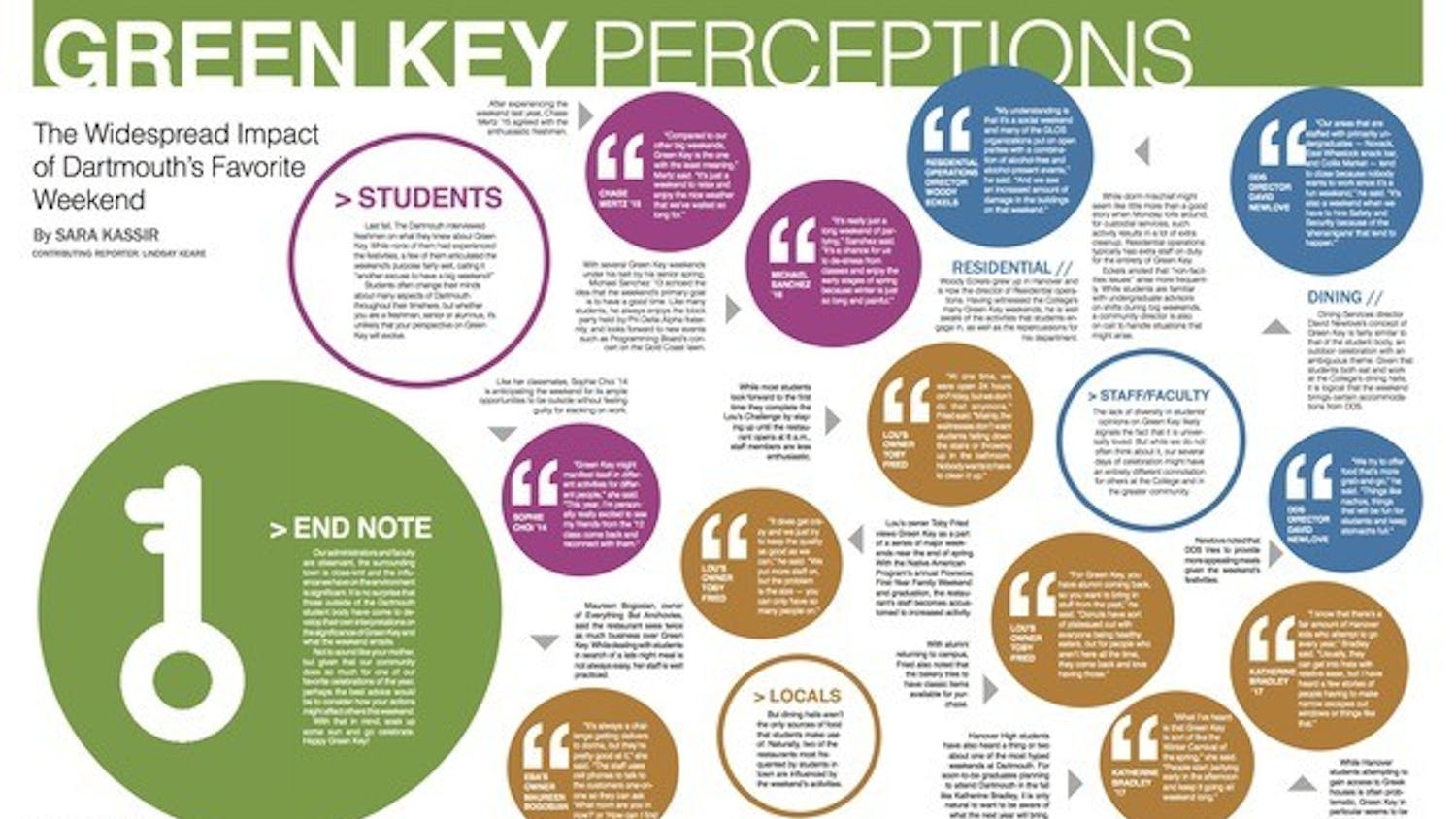This year’s Met Gala opened with the theme of “camp,” and the Gala’s attendants made attempts at capturing this aesthetic, some more successfully than others. Sontag, a pop culture theorist known for defining the term, explains the eponymous theme as a love of “artifice and exaggeration.”As it were, an object or event is more likely to be campy when it is unaware of its exaggerated, “so bad that it’s good” quality.
An event perhaps more emblematic of camp than the Met Gala was Dartmouth’s Green Key. While I am not pro-Green Key or anti-Green Key, I see this spring weekend as an opportunity to see the aesthetics of Dartmouth in a condensed way. Using the theory of camp to consider the excess of Green Key reveals the irony of Dartmouth culture — a genuine desire to dethrone elitism while simultaneously perpetuating it.
With one step onto Webster Avenue, the Gold Coast Lawn or Collis Patio, the three primary locations of Green Key events, one’s vision is overwhelmed with brightly colored bandanas, tie-dye shirts and a high concentration of Nantucket red and salmon pink shorts — even more than normal. Overalls are another popular Green Key clothing choice, often with one strap unbuckled and a fanny pack slung over the shoulder. Dartmouth’s general fashion aesthetic is often described as New England preppy and traditional, largely unconcerned with trends of urbanity popularized in various cities’ Fashion Weeks (with the exception of fraternity and sorority apparel parodying brands like Opening Ceremony and Supreme). Sontag notes that the camp aesthetic either undertakes an ironic quality or has a “serenity — or a naiveté — which is the equivalent of pastoral.” The common apparel during Green Key exaggerates a sense of the pastoral and heightens the sometimes willful, sometimes unintentional rejection of city fashion trends. The exaggeration of the pastoral during Green Key and the pervasiveness of “flair” is not only a parody of “cooler,” more contemporary trends, but is also a self-aware dig at our own overall aesthetic. Green Key, then, suggests a sense of lightheartedness. The abundance of happiness resists the stereotype of intellectual stuffiness.
Another key element of camp is “extravagance,” which occurs not only in the number of events that take place over the weekend but also in the intensely happy energy pervading the campus. Sontag’s examples of camp in culture include performance, especially performances of positive affect. A need to perform happiness takes the form of campy photography on Instagram; one’s feed during Green Key is flooded with people standing in the same poses, with the same smiles, in front of the same American flag-donning buildings. These photographs evoke memories of the loud cheering and fist-pumping of the concerts.
On the outside, Green Key evokes a sense of lightheartedness and fun — which, to an extent, is true. The intensity of Green Key weekend can form the basis of happy memories lounging at the Organic Farm during Brewhaha; running into old friends in the middle of a large crowd; or simply the pastoral sense of togetherness while nodding along to a song at Kappa Delta Epsilon. But on the other hand, “excess” translates to obnoxious messes left for janitors to clean,
extreme drinking and frequent outfit changes that are only feasible to the economically privileged. It also translates to a way to ignore more uncomfortable emotions by projecting an image of happiness. After all, another key component to camp is style over substance. This repression of negative affect during Green Key weekend is one example of the bigger conversation about mental health at Dartmouth and a growing consensus that many students pretend to be okay when they are in fact struggling with depression, anxiety or stress.
As an Ivy League institution with a hard-working ethic and a wealth of academic resources, it would be easy for Dartmouth to be seen as elitist. It is the lightheartedness of the student body as evident in events like Green Key and First-Year Trips that demonstrate a laudable effort to be down-to-earth. Nevertheless, it also reveals the inescapable need to perform happiness and exhibit privilege.


